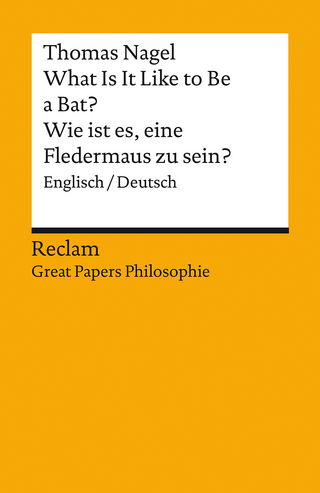
Peirce on the Uses of History
Seiten
2022
De Gruyter (Verlag)
978-3-11-099674-6 (ISBN)
De Gruyter (Verlag)
978-3-11-099674-6 (ISBN)
Peirceana provides a forum for the best current work on Peirce worldwide. Besides monographs, the series will publish thematically unified anthologies and edited volumes with a defined topical focus and untranslated English selections of Peirce’s writings.
The present book is the first to undertake a systematic study of Peirce’s conception of historical knowledge and of its value for philosophy. It does so by both reconstructing in detail Peirce’s arguments and giving a detailed account of the many ways in which history becomes an object of explicit reflection in his writings. The book’s leading idea may be stated as follows: Peirce manages to put together an exceptionally compelling argument about history’s bearing on philosophy not so much because he derives it from a well-articulated and polished conception of the relation between the two disciplines; but on the contrary, because he holds on to this relation while intuiting that it can easily turn into a conflict. This potential conflict acts therefore as a spur to put forth an unusually profound and multi-faceted analysis of what it means for philosophy to rely on historical arguments. Peirce looks at history as a way to render philosophical investigations more detailed, more concrete and more sensitive to the infinite and unforeseeable nuances that characterize human experience. In this way, he provides us with an exceptionally valuable contribution to a question that has remained gravely under-theorized in contemporary debates.
The present book is the first to undertake a systematic study of Peirce’s conception of historical knowledge and of its value for philosophy. It does so by both reconstructing in detail Peirce’s arguments and giving a detailed account of the many ways in which history becomes an object of explicit reflection in his writings. The book’s leading idea may be stated as follows: Peirce manages to put together an exceptionally compelling argument about history’s bearing on philosophy not so much because he derives it from a well-articulated and polished conception of the relation between the two disciplines; but on the contrary, because he holds on to this relation while intuiting that it can easily turn into a conflict. This potential conflict acts therefore as a spur to put forth an unusually profound and multi-faceted analysis of what it means for philosophy to rely on historical arguments. Peirce looks at history as a way to render philosophical investigations more detailed, more concrete and more sensitive to the infinite and unforeseeable nuances that characterize human experience. In this way, he provides us with an exceptionally valuable contribution to a question that has remained gravely under-theorized in contemporary debates.
Tullio Viola, University of Erfurt.
| Erscheinungsdatum | 17.06.2022 |
|---|---|
| Reihe/Serie | Peirceana ; 4 |
| Zusatzinfo | 1 b/w ill., 2 b/w tbl. |
| Verlagsort | Berlin/Boston |
| Sprache | englisch |
| Maße | 155 x 230 mm |
| Gewicht | 549 g |
| Themenwelt | Geisteswissenschaften ► Philosophie ► Philosophie der Neuzeit |
| Schlagworte | Charles S. Peirce • Geschichtsphilosophie • Peirce, Charles S. • Philosophy of History • Pragmatism • Pragmatismus |
| ISBN-10 | 3-11-099674-X / 311099674X |
| ISBN-13 | 978-3-11-099674-6 / 9783110996746 |
| Zustand | Neuware |
| Informationen gemäß Produktsicherheitsverordnung (GPSR) | |
| Haben Sie eine Frage zum Produkt? |
Mehr entdecken
aus dem Bereich
aus dem Bereich


